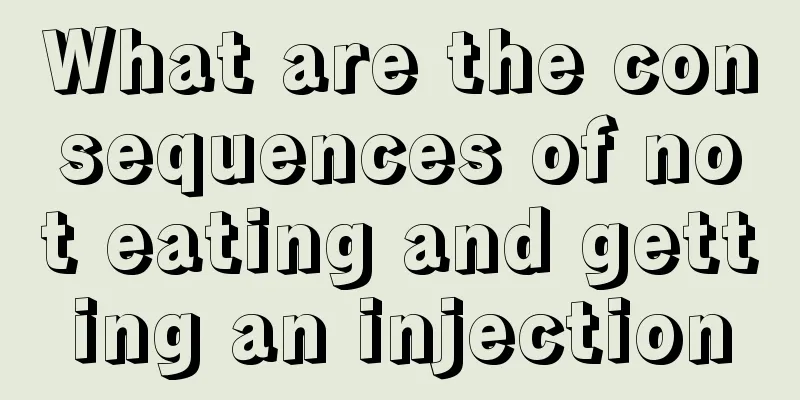What are the consequences of not eating and getting an injection

|
I believe that when many people go to the hospital, the doctor will ask them to get an injection or take medicine after a meal. Because most people have food in their stomachs after eating, it is not easy to cause damage to the stomach if they take medicine or get an injection. So people usually eat before taking medicine or getting an injection. But some people get an injection without eating. What are the consequences? Patients who receive drug infusions on an empty stomach are prone to adverse drug reactions such as dizziness, palpitations, sweating, nausea, and gastrointestinal discomfort. The reasons are: first, the state of hunger itself can cause pathological reactions in some patients; second, the fasting state can sometimes become a factor that induces and aggravates adverse drug reactions. Some weak and elderly patients have impaired compensatory function in maintaining blood sugar stability. When they cannot eat in time, they may experience symptoms of low blood sugar such as dizziness, palpitations, sweating, etc. Some patients are in good physical condition and delaying meal time would not cause any problems. However, when the injected drugs have a certain effect on blood sugar levels, they may occasionally cause symptoms of hypoglycemia. Ciprofloxacin and levofloxacin are safe, effective and commonly used fluoroquinolone drugs, but both have been reported to cause abnormal increases or decreases in blood sugar levels. The instructions for use of certain non-antihypertensive drugs, such as the Erigeron breviscapus injection, which has the effect of promoting blood circulation and removing blood stasis, indicate that they may sometimes cause a temporary drop in blood pressure, as well as adverse reactions such as palpitations, hot flashes, dizziness, and headaches. When injecting this type of drug, patients should also be advised to eat first so that the body can obtain adequate energy supply, thereby having good blood pressure regulation ability and increasing the ability to resist adverse drug reactions. Macrolide drugs have gastrointestinal motility effects, and symptoms such as abdominal pain, bloating, nausea, vomiting and diarrhea are also common adverse reactions to injection. In the fasting state, macrolide drugs in the blood can come into close contact with the gastrointestinal wall and exert their gastrointestinal motility effect. When the drug is administered after a meal, the process of the human body absorbing water and various nutrients in food will affect the distribution and effect of the drug in the gastrointestinal wall, reducing adverse stimulation to the gastrointestinal tract. Blood glucose levels themselves are also directly related to gastrointestinal motility status. Hypoglycemia increases gastrointestinal motility, while hyperglycemia slows down gastrointestinal motility and even causes gastroparesis. Therefore, having patients inject macrolides after meals can reduce the gastrointestinal hypermotility caused by drugs. |
<<: The best treatment for foot bone spurs
>>: What medicine should I take for bone spurs on my heels
Recommend
What are the benefits of beeswax to people
Many people don't know enough about beeswax. ...
Is it normal for a mole to have a black scab?
I believe many people have had the experience of ...
How do I know if I have nasopharyngeal cancer
How do I know if I have nasopharyngeal cancer? 1....
If you find thyroid cancer, you need to do these tests
Because thyroid cancer is an organ that controls ...
What is the reason for stiff facial muscles and inability to smile?
Generally, facial muscles appear stiff. It is ver...
When is the best time to use sunscreen spray
The outdoor temperature is very high in summer. M...
How to treat acne caused by poor liver and lung function in autumn and winter
In autumn and winter, the weather is relatively d...
The harm of long sleep time
After a busy day or during holidays, many people ...
What is the best way to clean oil stains on clothes
Many times, people accidentally get oil stains on...
How to quickly get rid of shingles?
Shingles is a skin disease caused by the varicell...
Is back pain caused by cervical cancer metastasis? It may not be the metastasis of cancer cells
If patients with cervical cancer experience back ...
Why does my chest hurt when I smoke too much?
For friends who suffer from chest pain due to smo...
Epilepsy should pay attention to
After suffering from epilepsy, people sometimes e...
The man's psychology after a couple quarrels, this hurts the woman the most
After many couples quarrel, some of the men’s beh...
What to eat to prevent liver cancer? Experts recommend eating these often
Prevention of liver cancer starts with daily diet...









